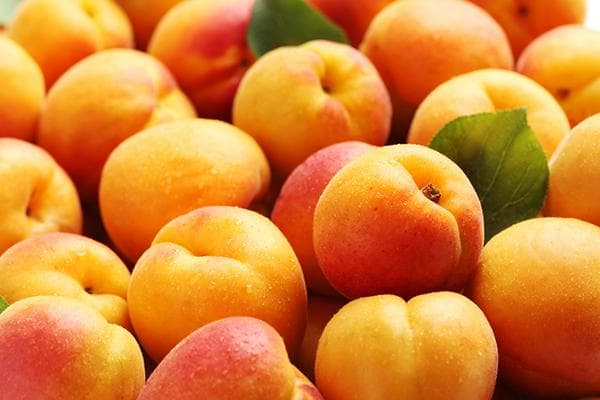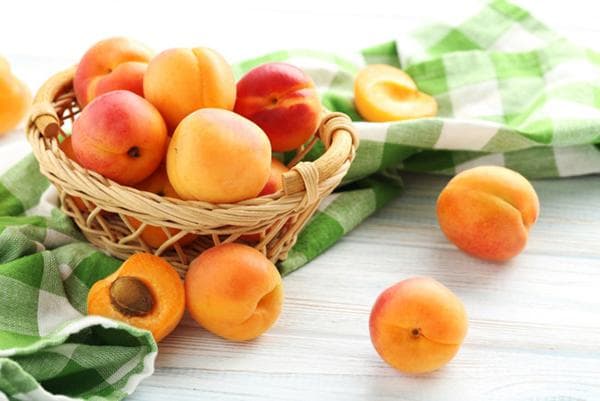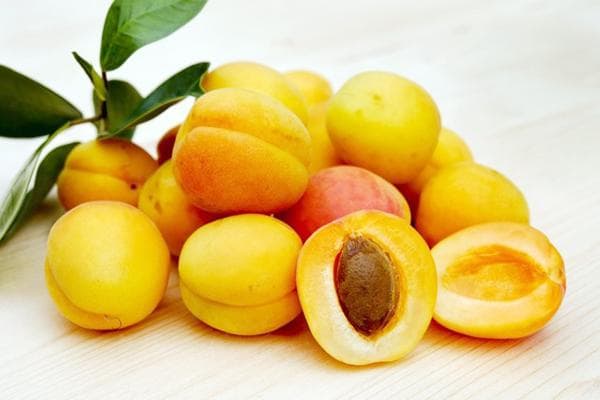Why the body requires apricots: the benefits and harms of sunny fruits
Content:
We have collected the most valuable information about apricots: health benefits and harms, contraindications, rules for selection, storage and consumption. Juicy yellow-orange fruits are a natural storehouse of vitamins, minerals, and organic acids. At the same time, apricots have a low calorie content (44 calories per 100 g) and are considered a dietary product. Be sure to include them in your diet!

Chemical composition of apricots
Apricots are one of the healthiest fruits for the human body. They contain chemicals in high concentrations that have a positive effect on the functioning of internal organs and systems.
Table 1. Composition of fresh apricot
| Name of substance | % of daily value in 100 g | Beneficial features |
|---|---|---|
| Alimentary fiber | 10,5 | Normalize intestinal motility, promote the growth of healthy microflora, remove toxins from the body, improve kidney and liver function |
| Vitamin A and beta carotene | 29.7 and 32 | Strengthen vision, improve the appearance of skin and hair, prevent reproductive disorders in women and men |
| Vitamin B2 | 3,3 | Serves as a preventive measure for diseases of the nervous system, participates in protein, carbohydrate and fat metabolism, accelerates cell regeneration, and maintains the normal condition of the mucous membranes of internal organs. |
| Vitamin B5 | 6 | Stimulates the production of adrenal hormones, strengthens the immune system, improves brain function |
| Vitamin C | 11 | Increases the strength and elasticity of blood vessels, prevents cancer and premature aging, improves the functioning of the immune system |
| Vitamin E | 7,3 | Protects the body from many types of cancer (in particular, prostate, bladder), accelerates tissue regeneration and blood microcirculation, has a rejuvenating effect |
| Vitamin PP (B3) | 4 | Improves blood circulation and blood composition, supports the health of the nervous system and brain, reduces the level of “bad” cholesterol, stimulates the production of digestive enzymes |
| Potassium | 12,2 | Removes excess fluid from the body, cleanses the kidneys, normalizes heart rate and blood pressure |
| Silicon | 16,7 | Increases the strength of bones and cartilage, stimulates collagen synthesis |
| Phosphorus | 3,3 | Ensures normal growth of bone tissue, improves brain function |
| Iron | 3,9 | Increases hemoglobin levels in the blood, supports thyroid health, prevents chronic fatigue and depression |
| Manganese | 11 | Strengthens bone and connective tissue, participates in carbohydrate metabolism |
Apricots also contain the polysaccharide inulin. This compound normalizes blood sugar levels, accelerates the process of burning fat, and removes toxins and radionuclides from the body.Apricot juice contains tannins, which have anti-inflammatory and antibacterial properties.
Apricot kernels, albeit in low concentrations, contain two toxic substances: hydrocyanic acid and amygdalin glycoside. Therefore, you should not specifically eat them. Apricot kernels produce valuable base oil, similar in composition to peach oil. The product is used for cosmetic purposes, in particular, to care for dry, aging skin.
Scientists are still arguing about which country should be considered the birthplace of the apricot. Some call the Tien Shan region in China, others call Armenia.
TOP 6 beneficial properties of apricots
Apricots are beneficial for men, women, children and the elderly. Regular consumption of these fruits can prevent the development of chronic diseases or improve well-being with existing ailments. Why is it good to eat bright orange fruits every day?
1. Strengthen vision
Apricot is the leader among fruits imported to Russia in terms of vitamin A and beta-carotene content. A deficiency of these substances can lead to drying out of the cells of the cornea of the eye, impaired color perception, and deterioration of vision in the dark. To prevent these diseases, eat fresh apricots and dried fruits (dried apricots, apricots).
Bright orange, almost red fruits contain more beta-carotene than yellow ones.
2. Normalize digestion
The intestines are an internal organ that urgently needs dietary fiber (fiber). And apricots are rich in the latter. Dietary fiber has the following medicinal properties:
- serve as food for beneficial microflora;
- prevent dysbacteriosis, manifested in the form of constant bloating;
- facilitate the digestion of food and improve the absorption of vitamins and minerals;
- relieve constipation;
- adsorb and remove from the body bacteria that produce fecapertenes - potential carcinogens.
Fiber provides a person with a long-lasting feeling of fullness by filling the stomach. That is, apricots indirectly help control appetite.
3. Prevent heart and vascular diseases
The main value of apricots for the heart is their high potassium content, as well as the presence of magnesium, inulin and, again, dietary fiber. Fruits normalize the water-salt balance in the body, preventing surges in blood pressure. They are an excellent preventative against atherosclerosis, as they cleanse blood vessels of triglycerides and reduce the level of “bad” cholesterol. The fruits strengthen the heart muscle.
4. Serve as cancer prevention
Apricots are a fruit with an antitumor effect. They contain many antioxidant substances that neutralize the negative effects of free radicals and prevent the growth of cancer cells. These are, in particular, vitamins A, C, E, biotin.
Dietary fiber reduces the risk of colon cancer, one of the most common types of malignant neoplasms in the world.
5. Improves mental abilities
Apricot is an indispensable fruit for a child who wants to improve their performance at school, or an adult engaged in mental work. B vitamins accelerate the transmission of nerve impulses in brain cells, and vitamin C increases cerebral circulation. As a result, a person thinks better and remembers large amounts of information more easily. Carbohydrates in the product improve mood.
6. Promotes weight loss
Since the fruit is low in calories, but at the same time quite filling, it can be included in the diet menu when losing weight. It is better to use apricot as a light snack before 16:00. The product speeds up metabolism, increasing energy expenditure throughout the day. Dietary fiber removes excess fats obtained from food from the body.
Apricots contain chromium in small quantities. This trace element normalizes blood sugar levels and at the same time reduces appetite. Helps prevent overeating and cravings for high-calorie foods.
Who are apricots contraindicated for?
Unripe fruits can cause harm to the body. They have a high concentration of acids, which cause irritation of the gastric mucosa and destruction of tooth enamel.
If you abuse the product, you may experience side effects such as diarrhea, abdominal cramps, and nausea. An overdose of vitamin A threatens a person with headache, vomiting, yellowing of the skin, and impaired liver function.
Contraindications to eating apricot are as follows:
- tendency to diarrhea;
- allergy;
- gastritis, stomach ulcer, increased acidity of gastric juice;
- liver hepatitis.
Doctors have different opinions about whether orange fruits can be eaten if you have diabetes. 100 g of apricots contain from 4.7% to 27% sugars. Very sweet varieties are “Pineapple” (“Shalah”), dried “Sheptala”. If you have high blood sugar, you should definitely stop using them. The remaining varieties should be eaten with caution: rarely, in small quantities, monitoring glucose levels with a glucometer.
For pregnant women, apricots are useful in moderation - up to 3 pieces per day. These fruits can also be eaten while breastfeeding if the baby does not have allergic reactions.
How to choose delicious fruits?
Apricots are brought to local markets from June to August. To choose quality fruits, pay attention to their appearance. Ripe fruits have a bright yellow or orange color, thin and delicate skin that does not deform when pressed, a fruity aroma without foreign notes (rot, grass, alcohol).
The absence of a characteristic fuzz on the skin does not mean that the fruit is bad. There are simply “bald” varieties of apricot.
It is better to buy unripe apricots than overripe ones. The latter will not bring benefits to the body, since they have lost most of the vitamins. But “green” fruits can be brought home and wrapped in paper. In 1–2 days they will be ripe and tasty.
Storage periods and rules
After purchasing apricots, you should eat them as soon as possible. Ripe fruits are kept in the refrigerator for no more than 3–4 days, at room temperature – 1–2 days.
How to store dried apricots long term? Place dried apricots in a paper bag or glass jar. Apricots and dried apricots can last up to 18 months without spoiling. The optimal conditions are: temperature – 10–20 degrees, humidity – up to 25%, dark place.
How to properly eat apricots?
If you want maximum health benefits, eat ripe apricots fresh. 4-5 pieces per day are enough. If you eat more, you may experience bloating and diarrhea. Remember to wash the fruit thoroughly under running water before eating.
You should not eat apricots on an empty stomach. They stimulate the production of gastric juice, which, in the absence of food in the stomach, has a strong irritating effect on the mucous membrane.
Pieces of fresh apricot, as well as dried apricots, can be added to the following dishes:
- cottage cheese;
- ice cream;
- fruit salads;
- baked goods: pies, pies, puff pastries, muffins and cupcakes, shortbread cakes;
- poultry meat.
From the wild fruits of “Zherdela”, which contain a minimum of sugars, wonderful jam, marmalade and compote are obtained. Even unripe apricots are used in cooking. Their pulp makes a delicious marinade for meat dishes; such fruits are also better suited for canning.
Are frozen apricots healthy?
Freezing at a temperature no higher than -18 degrees allows you to preserve maximum nutrients in apricots. Only most of the vitamin C is lost. But vitamin A, beta-carotene, B vitamins, macro and microelements remain in frozen fruits. It is advisable to harvest apricots whole or in halves, without using sugar or citric acid. First, they should be thoroughly washed, dried, and if necessary, remove the seeds.
First, the apricots are laid out in one layer on a tray and placed in the freezer for 2-3 hours. Then they are quickly transferred to containers and completely frozen. You must first remove other foods from the freezer: meat, fish, vegetables. The fact is that apricot pulp absorbs foreign odors very easily.
So, apricots are not just delicious summer fruits, but also an alternative to pharmaceutical dietary supplements to strengthen the body. They prevent dangerous diseases such as cancer, atherosclerosis, and hypertension. Promotes healthy, gradual weight loss and increased immunity. Apricots can be eaten fresh or added to your favorite dishes. However, you should not abuse the product so as not to encounter hypervitaminosis and irritation of the gastrointestinal tract.











